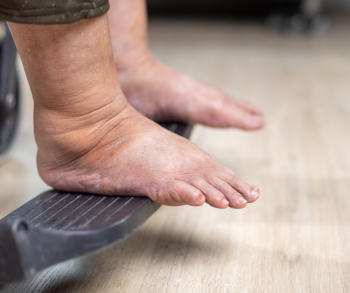Helping Seniors Understand Edema
September 18, 2025

After a few hours of gardening or simply being on their feet for a long time, seniors might notice swelling around their ankles but not think much about it. However, a few days later, when the swelling is not only still there but also spreads up their legs, they might begin to realize something is wrong. For seniors with companion care at home by their side, they get immediate support and a better understanding of what might be going on.
What Is Edema?
Edema is essentially the body's way of saying that fluid is accumulating where it shouldn't be. When excess fluid builds up in the body's tissues, it causes swelling that's most commonly visible in the feet, ankles, legs, and occasionally the hands or face. The best way to explain edema is to think of it like a sponge that's absorbed too much water—the tissue becomes swollen and may feel tight or uncomfortable to the touch.
The swelling occurs when tiny blood vessels leak fluid into surrounding tissues faster than the body's lymphatic system can drain it away. While occasional mild swelling after a long day on one's feet is normal, persistent or worsening edema often signals an underlying health issue that needs attention.
The Hidden Dangers of Ignoring Edema
While swollen ankles might seem like a minor inconvenience, companion care at home can help seniors understand that untreated edema can lead to serious complications. The excess fluid creates an ideal environment for infections to develop, particularly in the lower extremities, where circulation may already be compromised. Additionally, skin stretched by persistent swelling becomes fragile and prone to breaking, creating open wounds that heal slowly and may become infected.
More concerning is what edema might say about a senior’s overall health. Chronic fluid retention can signal heart failure, kidney disease, liver problems, or blood clots—all conditions that require prompt medical intervention. When the heart struggles to pump effectively, fluid backs up in the body's tissues. Likewise, when the kidneys can't properly filter waste and excess fluid, swelling occurs as the body tries to manage the overload.
Left untreated, severe edema can even restrict mobility and increase fall risk. The additional weight and altered sensation in swollen limbs make it harder for seniors to maintain their balance and move confidently. This creates a dangerous cycle where reduced activity leads to further circulation problems and more swelling.
Why Seniors Face Greater Risks
Aging naturally affects the body's ability to manage fluid balance. The heart muscle may weaken over time, making it less efficient at pumping blood throughout the body. Kidney function often declines with age, reducing the body's ability to eliminate excess fluid and sodium. Additionally, many medications commonly prescribed to seniors, including certain blood pressure medications and anti-inflammatory drugs, can contribute to fluid retention.
Seniors are also more likely to have multiple health conditions that increase edema risk. Diabetes, heart disease, and venous insufficiency all become more common with age. When combined with the more sedentary lifestyle that many older adults adopt, these factors create an ideal environment for the development of edema.
The key for seniors to work with companion care at home is to recognize that persistent swelling isn't just a normal part of aging—it's a symptom that requires medical attention. Ultimately, early intervention can prevent complications and significantly improve quality of life, helping seniors get back to the activities they love without discomfort or worry.
If you or your loved one is looking for Companion Care at Home in Santa Clara, CA, please call Familiar Surroundings Home Care.
Santa Clara County: (408) 979-9990
San Mateo County: (650) 353-9777
Santa Cruz County: (831) 480-3990


